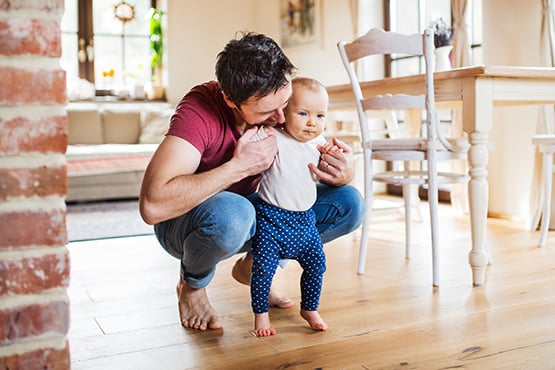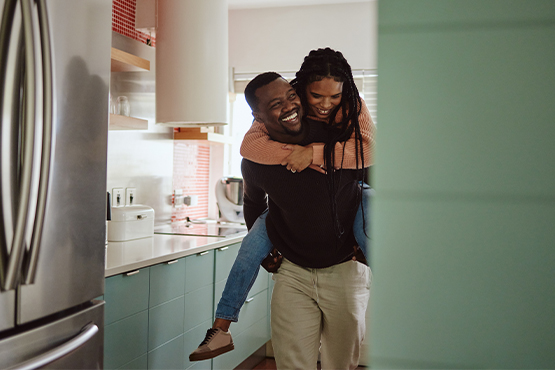Online Banking
Sign Up!
Moving into your next home can be exciting! It also comes with a ton of planning and preparation. And then there’s the age-old question: Should you rent or buy? We’ve compiled our top tips to help you unpack the answer.
When planning to make your next move, timing is everything. But when is the right time to keep renting? And how do you know it’s time to buy? In short: it depends on your current finances, future plans and present mortgage market trends. To help get you started, here are three important questions to consider:
This could hinder the homebuying process as it’s important to have a history with a company, as well as a stable, predictable income throughout your home search – and through the closing steps. Job history, along with employment verification, credit score and debt-to-income ratio all impact the lending rates you will receive while closing on your home.
In other words, do you like instant gratification? If you prefer to spend your money on items that bring you immediate happiness (like purchasing a sweater that you’ll wear right away or a new couch that you’ll show off during your next gathering), it’s definitely an adjustment to turn around and spend on something like a home. For example, you may not consider fixing a water heater or investing in a new furnace as “fun” spending.
If you’re planning to put down roots, then it may make sense to purchase your next home. Staying for the long haul has a ton of beneficial outcomes, including opportunities to support local charities, build your network and really invest the time with your current employer to work on professional development. It also helps if there’s a reasonable cost of living, low crime rates, good schools and vast community resources.
Ultimately, deciding to buy a home is one of the biggest financial decisions you will ever make. But fear not! We’re here to help you consider your best options. Let’s continue by examining some key factors:
Money is important to consider when deciding whether to rent or buy your next home. Ask yourself, can you afford to buy a new home? Here are some basic costs that would come with that decision:
But there are also perks: When evaluating your current financial situation, remember that interest and property taxes may be deductible.1 Also, as you pay down the loan principal, you’ll build equity – which can be an excellent asset for securing a different loan or line of credit down the road.
Additionally, most home values increase over time, which increases the amount of equity and your return on investment when you decide to sell your house. And – of course – once you pay the mortgage off, the home is all yours!
For some individuals, renting may simply make the best sense because it offers increased flexibility in certain cases. There are a number of reasons for this, such as:
In some cases, if you’re renting, you can negotiate electricity, waste/snow removal, Wi-Fi and various other monthly expenses right into your lease with your landlord! At the very least, you should ask. After all, what could it hurt?
In the interest of painting a full picture, however, there are some drawbacks to renting in place of purchasing a home. You should note that:
Is buying or renting ideal for your specific situation? Use this calculator to help you determine your next move:
At the end of the day, it’s important to do what’s right for you and your financial situation. Before deciding whether to rent or buy, do your research by meeting with a mortgage lender. They’ll help you explore what options you have for loans and interest rates, as well as share helpful advice on next steps.
Additionally, consider using a website like Zillow to take virtual peeks at homes in your market. This will help you best understand housing market availability, price ranges (helping you know how much to save for) and neighborhood details.
You’ll want to note some of the details that matter most to you, such as if the available homes are close to schools, if there are tax differences between states (if you live in a bordering city, for example) and if you’re within reasonable proximity to your office, family members, friends, retail areas, etc. All of this will help expedite the process, once you’re ready to meet with a realtor and make your next move.
Whatever you may decide is right for your next steps, we’re here to support you! Let’s get you home – wherever that may be.

There's a lot that goes into buying your first home. We've gathered all the information needed to assist you in preparing to take the leap.

Buying a home is one of the biggest – and best – decisions you’ll ever make. Here are 10 steps to make it simple!

You’ve been looking for the right home, carefully researching and vetting each listing. But are you prepared for the down payment? We’ve got you covered with six helpful tips!

Looking to cut down on closing costs for your home sweet home? We’ve assembled seven basic tips for saving your hard-earned money during the process!
1 Ask your tax consultant about possible benefits and tax advantages.
2 This $250 credit only applies to first-time homebuyers purchasing a primary residence within 100 miles of a Gate City Bank location. Customers must have a Gate City Bank checking account. Other terms, conditions and qualifications may apply. The credit will show up on the mortgage loan at closing.